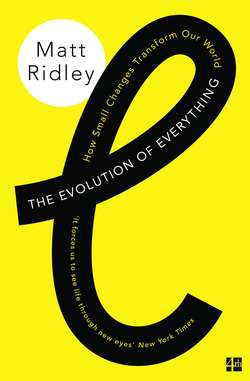Читать книгу The Evolution of Everything: How Small Changes Transform Our World - Matt Ridley, Matt Ridley - Страница 7
The Lucretian heresy
ОглавлениеIt is by the thinnest of threads that we even know the poem De Rerum Natura. Although it was mentioned and celebrated by contemporaries, and charred fragments of it have been found in the Villa of the Papyri at Herculaneum (a library belonging probably to Julius Caesar’s father-in-law), it sank into obscurity for much of history. Passing quotations from it in the ninth century AD show that it was very occasionally being read by monks, but by 1417 no copy had been in wide circulation among scholars for more than a millennium. As a text it was effectively extinct. Why?
It is not hard to answer that question. Lucretius’s special contempt for all forms of superstition, and indeed his atomism, which contradicted the doctrine of transubstantiation, condemned him to obscurity once the Christians took charge. His elevation of the pleasure principle – that the pursuit of pleasure could lead to goodness and that there was nothing nice about pain – was incompatible with the recurring Christian obsession that pleasure is sinful and suffering virtuous.fn1
Whereas Plato and Aristotle could be accommodated within Christianity, because of their belief in the immortality of the soul and the evidence for design, the Epicurean heresy was so threatening to the Christian Church that Lucretius had to be suppressed. His atheism is explicit, even Dawkinsian, in its directness. The historian of philosophy Anthony Gottlieb compares a passage from Lucretius with one from Richard Dawkins’s The Selfish Gene. The first talks of ‘the generation of living creatures’ by ‘every sort of combination and motion’; the second of how ‘unordered atoms could group themselves into ever more complex patterns until they ended up manufacturing people’. Lucretius was, carped John Dryden, at times ‘so much an atheist, he forgot to be a poet’. He talks about people ‘crushed beneath the weight of superstition’, claims that ‘it is religion breeds wickedness’ and aims to give us ‘the power to fight against the superstitions and the threats of priests’. Little wonder they tried to stamp him out.
They almost succeeded. St Jerome – keen to illustrate the wages of sin – dismissed Lucretius as a lunatic, driven mad by a love potion, who then committed suicide. No evidence to support these calumnies exists; saints do not show their sources. The charge that all Epicureans were scandalous hedonists was trumped up and spread abroad, and it persists to this day. Copies of the poem were rooted out of libraries and destroyed, as were any other Epicurean and sceptical works. Almost all traces of such materialist and humanist thought had apparently long since vanished from Europe when in 1417 a Florentine scholar and recently unemployed papal secretary named Gian Francesco Poggio Bracciolini, stumbled upon a copy of the whole poem. Poggio was hunting for rare manuscripts in libraries in central Germany when he came across a copy of De Rerum Natura in a monastic library (probably at Fulda). He sent a hastily-made copy to his wealthy bibliophile friend Niccolò Niccoli, whose transcription was then copied more than fifty times. In 1473 the book was printed and the Lucretian heresy began to infect minds all across Europe.
